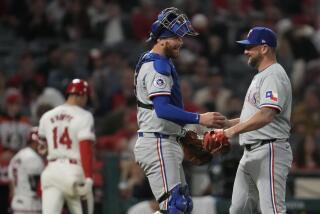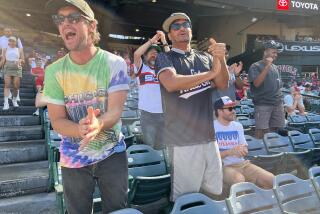Angels Lose; It Could’ve Been Worse
- Share via
BOSTON — So the Angels plunged into nine games against New York, Baltimore and Boston along the Eastern Seaboard and resurfaced with a 4-5 record, including Sunday’s 12-4 loss to the Red Sox.
Not bad, huh?
“Back when we had front-running teams, we’d be happy to come back from this trip one game under .500,” said Angel designated hitter Brian Downing, giving his memory a workout. “This is the trip we got buried on many times.”
So why aren’t the Angels smiling now?
For one, this team didn’t need to travel east to get buried. That already happened a good while ago, in places such as Oakland and Seattle and, especially, Anaheim.
But an even more sobering thought is this: Take away a fluke here and a minor miracle there and the Angels’ 4-5 record could have been--should have been?--an Oriolesque 0-9.
The Angels’ four East Coast victories, in review:
Angels 5, Yankees 4--The Angels are down, 4-3, and down to their last out before Downing lunges and pings a two-run home run off the left-field foul pole, a home run Downing maligned as “a weak fly ball.”
Angels 2, Orioles 1--The Angels manage one run through nine innings against Mike Boddicker, winless in his last 13 decisions, and score the go-ahead run on a 10th-inning double-play grounder when Baltimore’s interim manager, Elrod Hendricks, oddly decides to play his infield back.
Angels 9, Orioles 6--Trailing Baltimore, 6-1, after seven innings, the Angels rake the Baltimore bullpen for seven runs on seven singles in the eighth inning, most of them too soft to crack egg shells.
Angels 4, Red Sox 2--Right fielder Chili Davis commits two errors on one play, pitcher Chuck Finley loads the bases in both of the first two innings, catcher Butch Wynegar drops an inning-ending third strike, runner Wally Joyner botches a squeeze play by forgetting to slide . . . and still the Angels beat Roger Clemens, thanks in part to the Red Sox offense stranding 11 runners in 10 innings.
Now, about those five losses. Four of them were monstrous, coming by scores of 6-2, 9-2, 8-4 and 12-4. And, as is their custom, the Angels once more saved the worst for last.
The most remarkable aspect of Sunday’s game before 32,678 at Fenway Park was that the Angels actually led, 3-0, in the top of the third inning.
By the end of the third, the Angels trailed, 5-3, losing a lead as quickly as Chico Walker can misplay a routine fly ball and Willie Fraser can give up a three-run home run.
Fraser (4-3) had apparently pitched his way out of trouble in the inning when, with two outs and the bases loaded, he got Dwight Evans to flare a fly ball to center field, where Walker was stationed for the afternoon.
Third out of the inning, 3-0 shutout intact, Fraser figured.
“You can usually tell by the hitter’s reaction,” Fraser said. “When (Evans) hit it, he just jogged to first. I thought it was a catchable ball.”
Never, however, take anything for granted in the Angel outfield. Walker hesitated on the ball and then ran in hard, hoping to make up for lost time. Trying to make a shoestring catch, Walker ended up grabbing at air. Evans’ ball dropped for a hit, two runs scored. And two pitches later, Mike Greenwell delivered a three-run home run to right field.
“Willie should have been pitching with a 3-0 lead,” Angel Manager Cookie Rojas said. “Instead, he was suddenly pitching, down, 5-3.”
Just like that. Walker called his misplay “the play that turned the game around” and admitted “it was a very catchable fly ball.” But, in his opinion, he wasn’t the only Angel capable of catching it.
“It was more or less hit in between center field and right field,” Walker said. “If the right fielder gets a good jump, he can catch it. If the center fielder gets a jump, he can catch it.”
Walker got no jump at all on the ball. Was he then implicating Davis, the Angel right fielder, for not taking proper action?
“When a right-handed hitter hits a little quail like that, it usually sails back toward right,” Walker said. “There was no communication, no talking to each other. The play should have been made.”
Davis seemed taken aback when reporters asked him about his potential role on the fly ball.
“I’m surprised we even have to explain this,” Davis said. “If the ball was as catchable as it seems to you, it should have been caught.”
And, more from Davis: “If you can’t catch a ball, you better be sure you don’t call for it. . . . I didn’t call for it. And I didn’t hear him call for it. Some balls, you just can’t call for. Some balls are just perfectly placed or whatever.”
Then, a touch sardonically, Davis added: “I probably should have dove for the ball. But I don’t dive any more, not with this pin in my shoulder. (Davis suffered a separated shoulder with San Francisco two years ago). It won’t help the ballclub, or me, if I go on the DL for six or eight weeks or whatever.”
Rojas, meanwhile, had a simple--and angry--response to questions about Evans’ fly ball.
“The ball should have been . . . caught,” Rojas snapped. “No . . . excuses, no . . . alibis. We’re not talking about a line drive, we’re talking about a regular fly ball. Somebody should have caught it.”
That wasn’t the only Angel botch of the day--hardly, not in a 12-4 loss--but it proved the most damaging. Runners-up included:
--Shortstop Dick Schofield bobbling the ball on a double-play attempt that should have ended the third inning. Instead, Ellis Burks was safe at first with two outs and the stage was set for a five-run inning.
--Schofield, this time on the basepaths, pulling up at second base and kicking the bag, assuming Downing had hit a foul ball down the left-field line when third base umpire Don Denkinger was ruling it fair. An over-eager fan bailed out Schofield by touching the ball, which automatically ruled Downing’s hit a ground-rule double.
--Walker letting another ball get by him in center field in the fifth inning, allowing two more Boston runs to score.
--Reliever DeWayne Buice, called upon to mop up, opening the eighth inning by surrendering a double to Marty Barrett and a home run to Wade Boggs, his first of the season.
It was a messy end to a messy trip that was camouflaged by a bit of good fortune. Maybe things will improve once the Angels return to Anaheim for an eight-game home stand.
Then again, maybe not.
“What the hell’s the difference?” Rojas groused. “We’ve got to start playing winning baseball. It doesn’t matter where we play it.”
It didn’t happen here.
Angel Notes
Brian Downing hit the 200th home run of his big league career Sunday, driving a Jeff Sellers pitch just inside the left-field foul pole. Typically, Downing was unimpressed. “That certainly wasn’t the story today,” Downing said. “Who gives a damn what I did, correct or not? The fact I hit most of them with the Angels is nice, but 200 is not exactly 500.” Someone retrieved the ball for Downing, who unceremoniously tossed it into his equipment bag. “I don’t save anything,” he said. “I have no memorabilia. I’ll probably be hitting that ball in my batting cage at home tomorrow. That’s what I did with the ball I hit for my 1,000th hit.” Downing then asked a couple of reporters: “Is that negative, for me to think like that? I’ve just never been one to talk about achievements. I don’t have a scrapbook, I don’t have a trophy case. Of course, I’ve never won any trophies.”
It wasn’t Dick Schofield’s best day in Boston: A bobbled double-play ball in the third inning, a long pause at second base before discovering Downing’s fourth-inning double down the line was indeed fair. So when a writer approached him in the Angel clubhouse, Schofield tried to beg off: “No, no, please no.” He was just kidding. On the double play-that-wasn’t, Schofield said: “That’s a play that’s got to be made. I didn’t have a good grip on it, but I probably should’ve thrown it (sooner) anyway. I had a forkball grip on it, but I didn’t have a full hold of it.” On Downing’s double: “I didn’t see. I thought it was foul.”
Willie Fraser allowed 7 runs (6 earned) in 5 innings, yielding 9 hits, 2 walks and a home run. Sellers wasn’t much better (7 hits, 4 runs in 3 innings), which made his bid for his first 1988 victory all the more frustrating. “I just wanted to keep us in it, because I knew we were going to get to this guy,” Sellers said. Relief pitcher Bob Stanley earned the win, shutting out the Angels over the last 5 innings. . . . Angel first: Chico Walker drove in his first run as an Angel on a fourth-inning ground out, ending an RBI-less streak of 29 at-bats. Junior Noboa, subbing for the injured Mark McLemore, stroked his first Angel hit in the sixth inning. That raised Noboa’s batting average to .125 (1 for 8).
More to Read
Go beyond the scoreboard
Get the latest on L.A.'s teams in the daily Sports Report newsletter.
You may occasionally receive promotional content from the Los Angeles Times.






